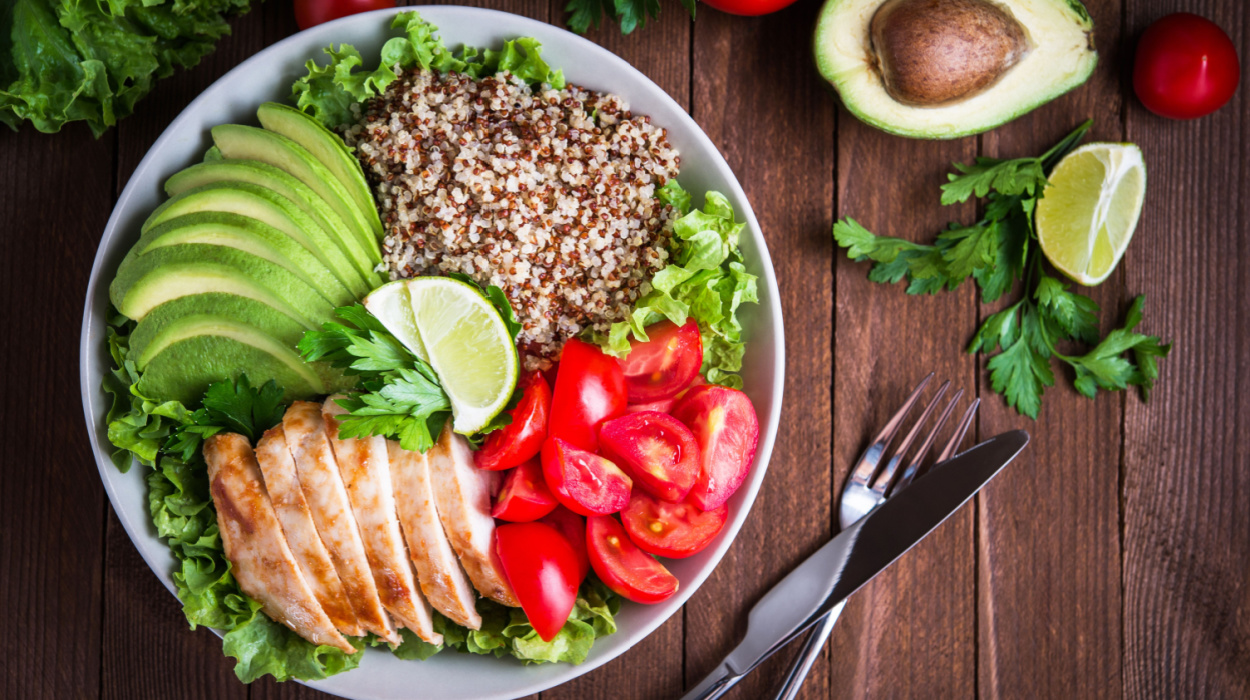Imagine being bloated and being so uncomfortable that you can barely sit up and relax. Bloating[1] is defined as a physical feeling of stomach fullness, which can lead to issues such as pain and a distended abdomen. If this often happens to you, it’s good to understand how to lose bloated belly fat.
As with most health concerns, it’s crucial to start by noting the root of the problem. After that, you can take steps like changing your eating habits and increasing physical activity to improve your health. Keep reading and learn about how to lose belly fat and bloating quickly.
How To Lose Bloating Belly
- Eat a balanced diet.
- Avoid carbonated beverages.
- Stop chewing gum.
- Embrace physical activity.
- Cease eating trans fats.
- Eat the right amount of fiber-rich foods.
- Lower consumption of sugary foods.
- Cease eating processed foods.
- Drink adequate water.
- Limit lactose-containing dairy products.
How To Lose Bloated Belly Fat
Bloated belly fat can lead to discomfort and even pain as gas remains trapped in your digestive system. If you want to begin the process of addressing bloated belly fat, try adding the following habits to your daily routine:
Eat A Balanced Diet

Food is a common trigger[2] for bloating, and consuming more unhealthy food can lead belly fat to accumulate.
Thankfully, some foods can help with bloating and also help you reduce belly fat. Start by eating a balanced diet made up of whole foods,[3] and learn how to eat less overall. After that, take note of what foods reduce bloating and can help ease your discomfort.
Get rid of bloating by eating avocados, which are full of essential nutrients. avocados[4] come in handy when you need more fiber to aid the digestive system. When food moves more slowly through the digestive tract, you are at a greater risk of bloating as a result of constipation.
Next, consider eating plain natural yogurt to improve your gut health.[5] Yogurt contains loads of probiotics that reduce indigestion and bloating.
Lastly, consider adding ginger to your meals and drinks to improve digestion. Fresh ginger and ginger supplements both aid with digestion, so this ingredient can help food move through your system more quickly. This comes in handy when you want to avoid a bloated stomach.
Avoid Carbonated Beverages
Soda and other carbonated beverages[6] are known to cause bloating because they contain high amounts of carbon dioxide. Plus, they also lead to belly fat due to having a high sugar content. So, if you want to lose that bloated belly fat, cut out all carbonated drinks.
Drinking a can of carbonated beverages results in consuming a high amount of carbon dioxide. After drinking a carbonated beverage, gas in your stomach often causes pressure build up, or bloating.
Instead of sodas and other carbonated beverages, choose lower-sugar and lower-calorie alternatives. For example, try fruit-infused water or herbal teas.
Stop Chewing Gum
Chewing gum can cause some people to experience bloating. The act of chewing gum causes you to swallow excess air that becomes trapped in your stomach. If you continue chewing gum, you take in excess air which can lead to abdominal pain.
It’s better to stop chewing gum and find other ways to keep your breath fresh such as eating breath mints or using mouthwash.
Embrace Physical Activity

Having belly fat leads to lots of health issues, and it’s best to find ways to lose weight in order to prevent chronic conditions from developing.
Embracing physical activity[7] is doubly helpful for individuals looking to get healthier. A bloated stomach feels awful and can even lead to physical pain. Thankfully, getting active is a good way to remove bloating and also reduce belly fat without the need for diet pills.
Aerobic exercise is not only one of the best cardio exercises, but it’s also a great activity that can solve bloating.[8] Such workouts are excellent ways to reduce visceral fat and help you find relief from bloating. For instance, you can take up cycling, running, or swimming to burn fat fast[9] and relieve bloating[10] after eating.
At the same time, physical activity also works to relieve stress,[11] as it also can cause bloating.
Avoid Eating Trans Fats
A healthy digestive system makes eating a more enjoyable experience. However, it’s possible to be healthy and experience excess gas.
The components of food matter. For example, trans fats[12] may cause bloating and belly fat more than other kinds of fats.
Research[13] shows trans fats contribute to visceral fat that leads to health concerns. If you want to live a healthy and bloat-free life, it’s best to leave trans fats out of your meals.
Eat the Right Amount of Fiber-Rich Foods
Fiber is crucial for your digestive system since it aids in smooth digestion. That’s why it’s crucial to consume a healthy amount of dietary fiber[14] during each meal. Lack of fiber in your meals can lead to constipation and other health issues.
Now, as wonderful as dietary fiber can be, you must focus on only consuming enough to aid in digestion. Eating too much fiber[15] can lead to issues such as bloating and gas.
The body finds it harder to break down[16] large amounts of fiber. When this happens, the food begins fermenting and gas is one of the main byproducts of this process.
Other side effects of consuming too much fiber, apart from bloating, include constipation and diarrhea. It’s best to stick to 25 to 30 grams[17] of dietary fiber per day. Good sources of fiber include:
Lower Consumption of Sugary Foods
Added sugar[20] isn’t good for your digestive system. Sugar starts to affect your digestion in the large intestine. It limits water absorption in the large intestine, leading to bloating and other digestion problems.[21]
At the same time, people who suffer from fructose intolerance[22] must watch out for sugar. The digestive system has a hard time breaking down fructose, and it remains in the intestines.
People who drink sugary alcohol tend to have more abdominal fat and issues like bloating. Alcohol bloating is a common side effect of drinking sugary alcohol[23] like beer. People who drink too much often develop ‘beer bellies’ that consist of stubborn visceral fat.[24]
Learning how to lose bloated belly fat entails taking steps like minimizing sugary alcohol consumption. Such drinks have more calories than the body requires, and most end up as belly fat. Some side effects of frequent sugar consumption are weight gain[25] and bloating.
Avoid Eating Processed Foods
Research[26] shows that consuming processed foods leads to weight gain and belly fat. Processed foods have little nutritional value, so it’s best to swap them with whole foods. In addition, they add loads of calories to your diet that cause belly fat.[27]
If that’s not bad enough, eating processed foods can lead to bloating. Many processed foods contain two ingredients that are problematic in high amounts. Processed foods often have a lot of sodium[28] and added sugar alcohols such as xylitol and mannitol.
Cease eating processed foods to reduce belly fat and bloating that can affect your day. Examples of processed foods to cut from your diet include:
Drink Water
It’s important to stay hydrated, so make it a habit to drink water[31] daily. Hydration plays a role in numerous body functions and can even help with debloating.
One common reason for bloating is constipation. It gets harder to pass stool, and you can feel uncomfortable. However, drinking water is a good solution to constipation and helps prevent further bloating.
It’s better to switch from carbonated sodas and sugary drinks to water. Also, you can drink beneficial herbal teas,[32] like ginger tea.
Water is also a great way to detox toxins from your system. Excess sodium also causes bloating. Drinking water gets rid of sodium and also aids in better digestion of food.
Limit Taking Lactose-Containing Dairy Products
A bloated stomach can be a result of foods you consume, especially dairy products. Milk and similar products are beneficial for your health. However, they can also lead to bloating and gas, especially if you suffer from lactose intolerance.[33]
Food intolerance, as mentioned earlier, is a major cause of bloating and other digestive symptoms. Lactose intolerance is one common example and a reason to limit the consumption of dairy products.[34] Instead, stick to lactose-free products or alternatives that won’t lead to pain and discomfort. An alternative is to supplement with the digestive enzyme,[35] lactase, which will aid in breaking down the lactose in your gut.
How Long Does It Take To Lose Bloated Belly Fat?
Food triggers are one of the main causes of bloated belly fat. So, you must check your diet to reduce bloating and also lose hormonal belly fat. Changing your diet and exercising are among the best ways to lose visceral fat.
When Should You See Doctor
Simple bloating is easier to fix with diet changes, stopping habits like chewing gum, and getting active. However, if you experience severe bloating and constant pain, it’s time to see your doctor.
In specific instances, bloating can be a sign of a serious health condition such as irritable bowel syndrome.[36] People who experience irritable bowel syndrome often struggle with bloating and gas.
Another sign that you must see the doctor is severe abdominal pain.[1] Bloating is uncomfortable, but severe abdominal pain requires immediate medical attention.
Also, if bloating remains prevalent despite getting active and making dietary changes, head to the hospital. Other symptoms to watch out for include diarrhea, constipation, and blood in your stool.
Conclusion
Bloating can happen to anyone for different reasons. Normally, when you feel bloated, there’s excess gas in your stomach, causing discomfort and even abdominal pain. Some causes of bloating include eating unhealthy foods, drinking carbonated drinks, and chewing gum.
To lose bloated belly fat fast and experience relief, start by making healthy choices and eat whole foods. In addition, refrain from drinking carbonated drinks, exercise, and lower sugar consumption. Follow the different strategies listed above and you’re well on your way to mastering how to lose bloated belly fat. Consult a healthcare provider or registered dietitian for guidance on how to lose bloated belly fat.
Frequently Asked Questions
The fastest way to lose belly fat and bloating is to embrace healthy eating habits. Focus on nutritious foods that boost fat burning and less on processed foods. In addition, limit fiber intake to prevent more bloating.
The reason your belly is big but not fat is because of bloating. It’s full of air or gas due to certain habits. For instance, chewing gum makes you swallow excess air that ends up in your tummy.
The best way to get unbloated in 5 minutes naturally is to get active. Go for a walk, bike ride, swim, or jog. Physical activity helps get rid of bloating fast.
The best way to tighten hanging belly fat is to do core exercises. Examples of the best core exercises include the plank, sit ups and mountain climbers.
It’s important to watch your diet to reduce incidences of bloating. Examples of foods that cause bloating are dairy products, beans, sugary drinks, beers, and brussels sprouts.
Yes, if you are wondering ‘Do probiotics help with bloating; they are indeed good for bloating relief.
 Evidence Based
Evidence Based
